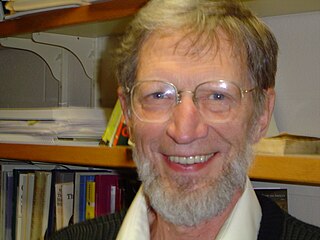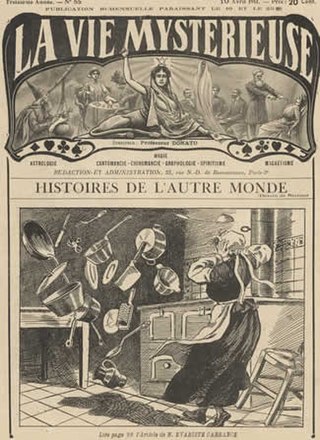Related Research Articles
Truth or verity is the property of being in accord with fact or reality. In everyday language, it is typically ascribed to things that aim to represent reality or otherwise correspond to it, such as beliefs, propositions, and declarative sentences.

Alvin Carl Plantinga is an American analytic philosopher who works primarily in the fields of philosophy of religion, epistemology, and logic.

Pragmatism is a philosophical tradition that views language and thought as tools for prediction, problem solving, and action, rather than describing, representing, or mirroring reality. Pragmatists contend that most philosophical topics—such as the nature of knowledge, language, concepts, meaning, belief, and science—are best viewed in terms of their practical uses and successes.

Richard Granville Swinburne is an English philosopher. He is an Emeritus Professor of Philosophy at the University of Oxford. Over the last 50 years, Swinburne has been a proponent of philosophical arguments for the existence of God. His philosophical contributions are primarily in the philosophy of religion and philosophy of science. He aroused much discussion with his early work in the philosophy of religion, a trilogy of books consisting of The Coherence of Theism, The Existence of God, and Faith and Reason. He has been influential in reviving substance dualism as an option in philosophy of mind.

William Lane Craig is an American analytic philosopher, Christian apologist, author, and Wesleyan theologian who upholds the view of Molinism and neo-Apollinarianism. He is a professor of philosophy at Houston Christian University and at the Talbot School of Theology of Biola University.

Edward Arthur Milne FRS was a British astrophysicist and mathematician.

The Euthyphro dilemma is found in Plato's dialogue Euthyphro, in which Socrates asks Euthyphro, "Is the pious loved by the gods because it is pious, or is it pious because it is loved by the gods?" (10a)
Michael Lou Martin was an American philosopher and former professor at Boston University. Martin specialized in the philosophy of religion, although he also worked on the philosophies of science, law, and social science. He served with the US Marine Corps in Korea.
Richard Henry Popkin was an American academic philosopher who specialized in the history of enlightenment philosophy and early modern anti-dogmatism. His 1960 work The History of Scepticism from Erasmus to Descartes introduced one previously unrecognized influence on Western thought in the seventeenth century, the Pyrrhonian Scepticism of Sextus Empiricus. Popkin also was an internationally acclaimed scholar on Christian millenarianism and Jewish messianism.
Francis J. "Frank" Beckwith is an American philosopher, professor, scholar, speaker, writer, and lecturer.
Quentin Persifor Smith was an American philosopher. He was professor emeritus of philosophy at Western Michigan University in Kalamazoo, Michigan. He worked in the philosophy of time, philosophy of language, philosophy of physics and philosophy of religion.
Metaphysical naturalism is a philosophical worldview which holds that there is nothing but natural elements, principles, and relations of the kind studied by the natural sciences. Methodological naturalism is a philosophical basis for science, for which metaphysical naturalism provides only one possible ontological foundation. Broadly, the corresponding theological perspective is religious naturalism or spiritual naturalism. More specifically, metaphysical naturalism rejects the supernatural concepts and explanations that are part of many religions.
Adolf Grünbaum was a German-American philosopher of science and a critic of both psychoanalysis and Karl Popper's philosophy of science. He was the first Andrew Mellon Professor of Philosophy at the University of Pittsburgh from 1960 until his death, and also served as co-chairman of its Center for Philosophy of Science, research professor of psychiatry, and primary research professor in the department of history and philosophy of science. His works include Philosophical Problems of Space and Time (1963), The Foundations of Psychoanalysis (1984), and Validation in the Clinical Theory of Psychoanalysis (1993).
The B-theory of time, also called the "tenseless theory of time", is one of two positions regarding the temporal ordering of events in the philosophy of time. B-theorists argue that the flow of time is only a subjective illusion of human consciousness, that the past, present, and future are equally real, and that time is tenseless: temporal becoming is not an objective feature of reality. Therefore, there is nothing privileged about the present, ontologically speaking.
Atheism, in the broadest sense, is an absence of belief in the existence of deities. Less broadly, atheism is a rejection of the belief that any deities exist. In an even narrower sense, atheism is specifically the position that there are no deities. Atheism is contrasted with theism, which is the belief that at least one deity exists.
Brian Leftow is an American philosopher specializing in philosophy of religion, medieval philosophy, and metaphysics. He is the William P. Alston Professor for the Philosophy of Religion at Rutgers University. Previously, he held the Nolloth Chair of the Philosophy of the Christian Religion at Oriel College, Oxford, succeeding Richard Swinburne.
Agnostic atheism — or atheistic agnosticism — is a philosophical position that encompasses both atheism and agnosticism. Agnostic atheists are atheistic because they do not hold a belief in the existence of any deity, and they are agnostic because they claim that the existence of a divine entity or entities is either unknowable in principle or currently unknown in fact.

Telekinesis is a purported psychic ability allowing an individual to influence a physical system without physical interaction. Experiments to prove the existence of telekinesis have historically been criticized for lack of proper controls and repeatability. There is no reliable evidence that telekinesis is a real phenomenon, and the topic is generally regarded as pseudoscience.
Religious epistemology broadly covers religious approaches to epistemological questions, or attempts to understand the epistemological issues that come from religious belief. The questions asked by epistemologists apply to religious beliefs and propositions whether they seem rational, justified, warranted, reasonable, based on evidence and so on. Religious views also influence epistemological theories, such as in the case of Reformed epistemology.